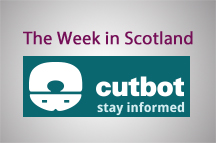Corroboration
 Let's start with something other than the referendum this week. Don't worry, we'll get to it soon enough. Just too late for last week's briefing, Holyrood debated Justice Secretary Kenny MacAskill's proposals to abolish the requirement for corroboration. It was, as they say, a frank exchange of views, and the Scottish Government's victory over all four opposition parties (and the SNP convenor of the Justice Committee) was as narrow as anything this session: just three votes in it. Oddly, despite opposition from the Yes-supporting Greens (and the aforementioned convenor), the Cabinet Secretary accused his opponents of taking this line as part of the Better Together's campaign strategy. During this session, the justice portfolio has emerged as the most likely area of policy for the SNP to find themselves without allies: before corroboration the same isolation occurred over their sectarianism legislation. When the Tories and the Greens are citing each other, less brave Ministers might conclude that something has gone wrong.
Let's start with something other than the referendum this week. Don't worry, we'll get to it soon enough. Just too late for last week's briefing, Holyrood debated Justice Secretary Kenny MacAskill's proposals to abolish the requirement for corroboration. It was, as they say, a frank exchange of views, and the Scottish Government's victory over all four opposition parties (and the SNP convenor of the Justice Committee) was as narrow as anything this session: just three votes in it. Oddly, despite opposition from the Yes-supporting Greens (and the aforementioned convenor), the Cabinet Secretary accused his opponents of taking this line as part of the Better Together's campaign strategy. During this session, the justice portfolio has emerged as the most likely area of policy for the SNP to find themselves without allies: before corroboration the same isolation occurred over their sectarianism legislation. When the Tories and the Greens are citing each other, less brave Ministers might conclude that something has gone wrong.
Business for (and against) Independence
 The battle over independence was primarily fought this week between corporate bosses, with BA's Willie Walsh coming out as a supporter of a Yes vote based on the SNP's plans for lower air passenger duty. It might be best for the Yes campaign not to point out to him that independence wouldn't necessarily mean another SNP majority in the 2016 election, but then very few in this debate seem to make that distinction. At the same time, Standard Life went entirely the other way, and the No camp will have been pleased to see how far that story went. Old Labour might have turned its nose up at this kind of argument, but Johann Lamont made the most of it. Our media monitoring service found agency copy about it as far away as the Medicine Hat News (!) and the Austin American-Statesman, to pick just two examples. By the time the pension funds and RBS/Lloyds stories were piled on top, it seemed like a long week since BA came out for Yes.
The battle over independence was primarily fought this week between corporate bosses, with BA's Willie Walsh coming out as a supporter of a Yes vote based on the SNP's plans for lower air passenger duty. It might be best for the Yes campaign not to point out to him that independence wouldn't necessarily mean another SNP majority in the 2016 election, but then very few in this debate seem to make that distinction. At the same time, Standard Life went entirely the other way, and the No camp will have been pleased to see how far that story went. Old Labour might have turned its nose up at this kind of argument, but Johann Lamont made the most of it. Our media monitoring service found agency copy about it as far away as the Medicine Hat News (!) and the Austin American-Statesman, to pick just two examples. By the time the pension funds and RBS/Lloyds stories were piled on top, it seemed like a long week since BA came out for Yes.
Salmond in London
A cynic might point out that support for independence is typically inversely proportional to income, and so it might be unsurprising to see corporate chiefs in the No camp. The First Minister is moving closer to this kind of left-populist position, something the centre-right independence body Wealthy Nation discussed this week. His keynote New Statesman speech on Tuesday was an assertive and pun-tastic effort to regain control, but, to paraphrase Zhou Enlai, it's too early to tell if he succeeded.
 One wee footnote: whichever side of the independence debate someone's on, I find respect for the other side's strengths to be an appealing quality. With that in mind, take a look at Andrew Wilson's review of Douglas Alexander's speech on enhanced devolution, if you missed it. I should declare an interest: I recently met Andrew to discuss their progress at Charlotte Street Partners and our latest public affairs monitoring service at Cutbot, and I'm very impressed with their plans.
One wee footnote: whichever side of the independence debate someone's on, I find respect for the other side's strengths to be an appealing quality. With that in mind, take a look at Andrew Wilson's review of Douglas Alexander's speech on enhanced devolution, if you missed it. I should declare an interest: I recently met Andrew to discuss their progress at Charlotte Street Partners and our latest public affairs monitoring service at Cutbot, and I'm very impressed with their plans.
James Mackenzie
Commercial Director, Cutbot Ltd












